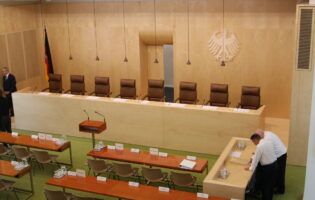Reconciliation Efforts in Japan and Germany
On January 20, 2010, the American-German Institute (AGI) hosted a luncheon discussion with Dr. Jennifer Lind, Dartmouth College, to discuss comparative reconciliation efforts in Japan and Germany. Most participants concluded that Japan’s hesitance to acknowledge and apologize to former victims is damaging Japan’s foreign relations with countries such as China and Korea. Through the discussion, most participants also felt Japan could learn from Germany’s past reconciliation efforts with its former victims and enemies (e.g., Israel and France).
Dr. Lind began the discussion by describing how she first started studying Japan’s reconciliation efforts with its victims of World War II. She described the process of researching and writing her dissertation, which was ultimately published as Sorry States: Apologies in International Politics (Ithaca, NY: Cornell University Press, 2008). Through her research, Dr. Lind eventually discovered three important findings regarding public apologies at the state level. First, it is important with regard to a country’s foreign relations that nations recognize and acknowledge past crimes. Second, there is some doubt, however, about the importance of public apologies. Third, atonement and apologies can be counterproductive for some nations, resulting in a political backlash. This last finding was the most intriguing to Dr. Lind, as it suggested the unyielding demands for some countries to apologize to former victims can actually do more damage than good.
Some participants then discussed comparable political backlashes to the Japanese experience and suggested that perhaps the backlash is merely a part of the entire reconciliation process. Backlash can, in fact, be seen as an integral part of any democratic state, as opposing political parties attempt to create meaningful changes to the political landscape. However, the backlash can be considered counterproductive when opposing factions glorify or condone past violence by denying the state’s ability to apologize for its crimes.
Governments’ reconciliation efforts through education were the next topic of discussion. This included Japan’s current efforts to jointly create history textbooks with Korea and China in order to give a more accurate depiction of its participation in World War II. Japan’s efforts were compared to the extensive education German students receive concerning Germany’s war crimes, and it was suggested Japan consider more thorough and accurate educational efforts.
In the concluding phase of the discussion, participants questioned whether Japan could neglect to apologize for its past crimes without seriously damaging international relations and its own image. There was a general call for more attention and scholarship to be brought to the issue.







